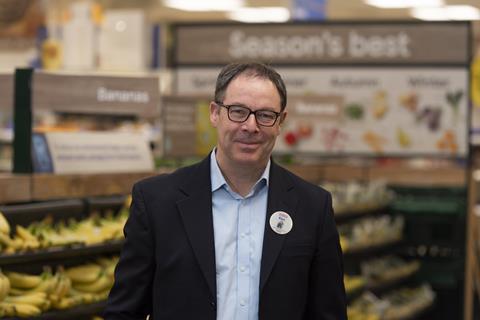
The “ambitious” environmental aims of the government’s new food strategy are unachievable because of the supply chain dominance of the major supermarkets, according to a new report by leading green campaigners.
The report by Foodrise, previously known as Feedback, claims that the strategy’s health, cost of living and climate change priorities identified in the spring are doomed to failure because of supermarkets’ stranglehold of more than 96% of grocery sales.
The charity also released a new YouGov poll showing substantial public support for new co-operative or employee ownership models, which it claims could be better able to operate with sustainability goals at their heart.
Supermarket bosses have strongly defended the model, saying it has been consistently looked into and approved by competition watchdogs.
Foodrise said although it lacked detail, it welcomed the food strategy, which was announced in December followed by ministers setting out 10 key health, environmental and economic goals in July. It described the strategy as a “critical opportunity to reorient the nation’s food system to support public health, the economy and the environment”.
However, its report said supermarket operations deals made them “structurally bound” to maximise profit above customer health, the planet or food security.
The charity, which changed its name in May, said it was calling on ministers to recognise that the existing model could not achieve the strategy’s goals. It recommended setting up alternatives including regional food hubs to supply shops, fruit and vegetable prescriptions, and other policies including business rate relief for independent sustainable food startups.
Today’s report accuses supermarket structures of being “hardwired for profit”.
“Supermarkets have the scale, resources, and central role in the UK food system to influence supply chains, diets, and environmental outcomes,” it says. “In theory, each model has unique levers which could support a transition to healthier, fairer, and more sustainable food.
“But in practice, all ownership models prioritise profit over people and planet, whether through short-term shareholder returns, relentless price competition, or centralised decision-making that excludes workers and communities.
“This profit-first logic creates systemic barriers to the food strategy’s objectives: unhealthy food environments, unsustainable supply chains, insecure domestic production, and erosion of local food cultures.”
Foodrise was especially critical of supermarkets for alleged “greenwashing”. It said nine supermarkets had set Scope 3 reduction targets for 2030, but as of May 2025, only four were publishing UK specific progress updates, of which only three (Co-op, Morrisons and Waitrose) showed progress in the right direction.
The report goes on to criticise the dominance of supermarkets on farmers and suppliers, claiming their “vast buying power” makes it impossible for other businesses to pursue environmentally focused strategies.
“They determine everything from which fruit and vegetables are grown, to whether plant-based options are stocked, and how much shelf space is given to healthier or more sustainable foods.
“Supermarkets shape people’s food options through pricing strategies, promotions, marketing, and product placement. This has significant knock-on effects for public health and inequity on a national scale.
Foodrise also released the results of an online poll of more than 2,000 representative UK adults conducted by YouGov last month, which it said showed widespread public support for change to the system.
The poll claims more than half (45%) of Brits think they do a bad job of both promoting local food products and helping people to cut down on food waste. Currently, more than 80% of fruit and almost 50% of vegetables are imported, while an estimated 40% of all food produced globally is wasted.
More than half (54%) thought the best way for supermarkets to be run was by co-operatives rather than the state (3%) or private companies (16%).
Meanwhile 65% said that CEOs of large supermarkets should not be paid more than £1m, citing Tesco CEO Ken Murphy’s pay in 2024 of £9.9m.
“Our food and farming is controlled by 10 profit-hungry supermarkets, with devastating consequence for public health, British farmers and for our planet,” said Carina Millstone, executive director at Foodrise.
“But our new data shows widespread public support for a different way forward courtesy of worker-owned food shops, which could help improve the nation’s health, while protecting the environment and making sure farmers get a better deal.
“We need to see urgent government action to fulfil the promises laid out in its food strategy by compelling supermarkets to change their practices, while working longer term to dismantle their control of the country’s food sector. Ministers are deluded if they think these big businesses are going to drive the change required for a healthy, sustainable food system without regulation forcing their hands.”
Andrew Opie, director of food and sustainability at the BRC, said: “The Competition & Market Authority (CMA) have consistently confirmed how our supermarkets work for British consumers.
”UK supermarkets work closely with their suppliers, delivering the best and most affordable choice of food in western Europe to British consumers. This has been particularly important for households on lower incomes who pay a higher proportion of their income on food.”



















No comments yet